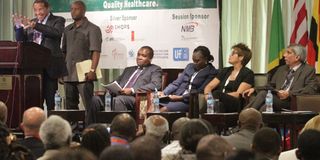Kikwete challenges WB to fund private health sector

Retired President Jakaya Kikwete addresses the 6th East Africa Healthcare Federation Conference and Pharmex 2017 Exhibition in Dar es Salaam yesterday. PHOTO | ANTHONY SIAME
What you need to know:
Instead, in his keynote address to more than 400 private health care leaders from East Africa and beyond, Mr Kikwete asked the World Bank to commit more funds to the private health sector. “Before blaming governments,” he noted, “how much money the World Bank loans the private health sector?”
Dar es Salaam. Retired President Jakaya Kikwete came out in defence yesterday, when a World Bank(WB) official pointed out weaknesses in the way governments in East Africa finance their health sectors and how leaders have failed to invest in local health infrastructure, yet they travel abroad to seek health care services.
Speaking during the ongoing East Africa Health Federation Conference in Dar es Salaam, Mr Kikwete said the governments had been striving to put up local health infrastructure that could help solve health problems, but noted that high standards, such as those provided in high income countries, could not be attained overnight.
Instead, in his keynote address to more than 400 private health care leaders from East Africa and beyond, Mr Kikwete asked the World Bank to commit more funds to the private health sector. “Before blaming governments,” he noted, “how much money the World Bank loans the private health sector?”
“It’s this same World Bank that has been telling governments not to guarantee loans to the private sector. What are you telling us now?” he queried as he challenged the WB official.
Mr Kikwete’s remarks came after the World Bank’s Head of Health in Africa Initiative, Prof Khama Rogo, castigated heath ministries in the region for laxity in health care financing and failing to fulfil health care benchmarks such as the Abuja Declaration, of committing 15 per cent of their budget to health care.
During the conference, attended by delegates from at least 12 countries across the world, Prof Rogo said governments in the region needed to dialogue with the World Bank on how to better finance the health sector and how to stop people from dying of preventable diseases.
He said, for instance, “Every time I hear in East Africa that a person has died of cholera, I agonise. Every time I hear that a leader in East Africa is travelling abroad for treatment, my heart stops. Under such conditions, my heart cannot be healthy. We at the World Bank are ready to help work with governments to sort out why health care financing is still facing challenges.”
“The solution is simple,” he suggested. “We need to dialogue. We need to talk on how this can be achieved and regulated,” he explained. “Ministries of health in the region should recognise health regulatory bodies. If this request is too much, then let’s accept, here in East Africa, that it’s okay for people to die of preventable diseases such as cholera.”
However, during the conference with the theme, “Health Care Financing: for Sustainable Quality Health Care,” Mr Kikwete urged the World Bank to create a special financing facility that would issue loans to private health facilities.
This was after some delegates from the East Africa Health care Federation (EAHF) explained how the private health sector was playing a complementary role with the public sector in enhancing delivery of quality health services to the people.
EAHF chairman, Dr Kaushik Ramaiya, called on members of the federation to discuss how the private health sector could be able to obtain loans from big financial institutions.
It’s here that Mr Kikwete said, “It’s the World Bank’s responsibility to help these private health facilities. If the private health sector is well financed, then, people will not die of cholera and we will not be sending people to India for treatment because the private sector here can sort this out.”
According to Ms Evelyne Gitonga, the director of Credit Fund-East Africa, 84 per cent of private health facilities in the region are in the “lower end” such as dispensaries and health centres, but they remain not financed and loans don’t reach them. She said when the lower level health facilities were not financed, the higher end health facilities, such as big hospitals got congested, yet it was the people in the lower end health facilities, who suffered most due to lack of adequate health care access.
The conference ends today and is hosted by the Association of Private Health Facilities of Tanzania (APHFTA), whose chief executive officer, Dr Samwel Ogillo, told delegates that the regional meeting was a platform to come up with solutions to perennial problems that were facing the private and public health sector in the delivery of quality health care to the people.
The executive director, East Africa Business Council, Ms Lillian Awinja, said: “The treaty that formed the East African Cooperation obliges East African countries to cooperate on matters related to health care and well-being. Article 118 of the EAC treaty gives us an opportunity as East Africa to come up with solutions to challenges facing health care financing in the region.”
After the conference, regional health experts believe they will have strengthened the health agenda towards achievement of the Sustainable Development Goals (SDGs) in Africa through the private health sector.



